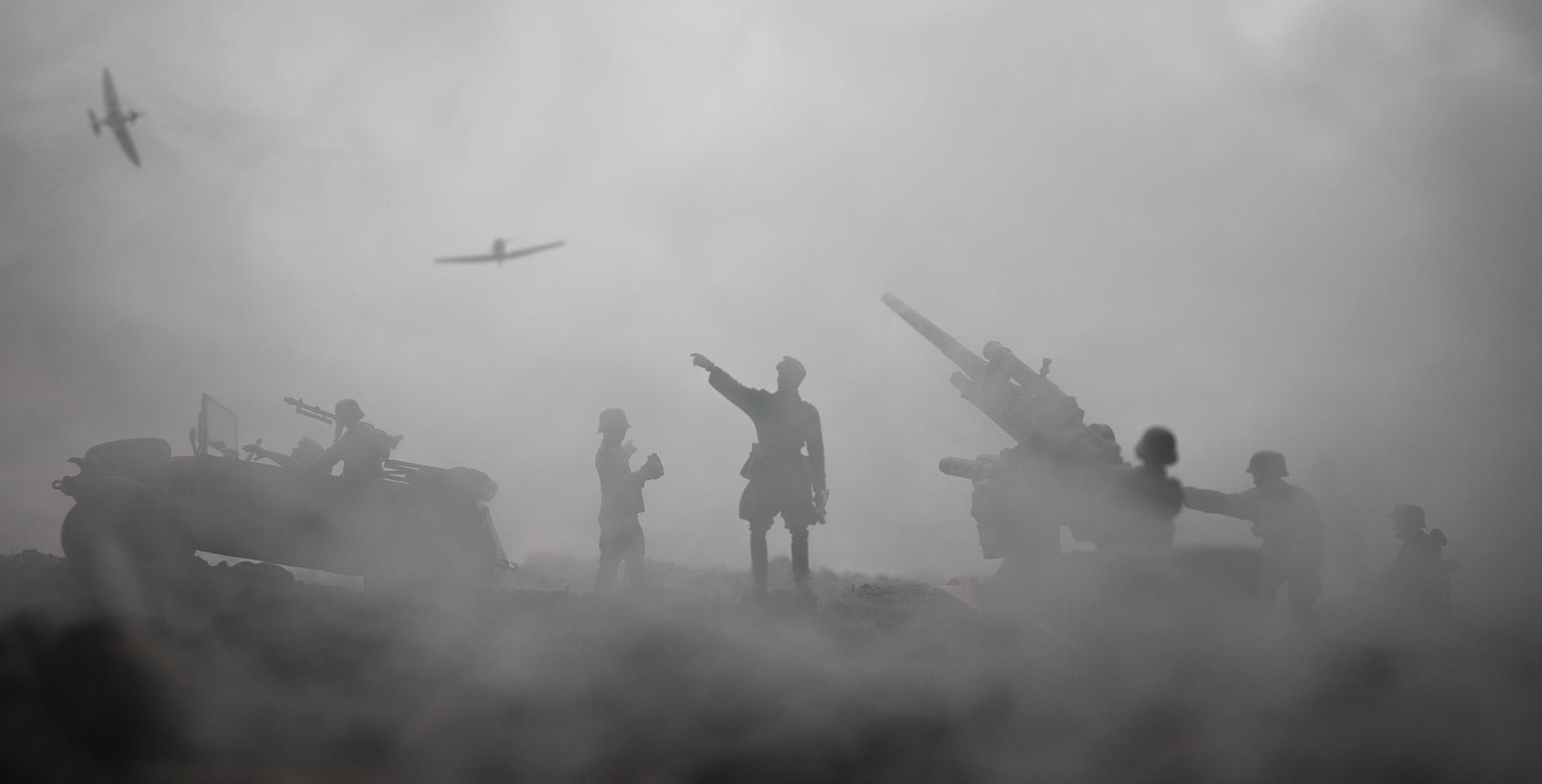Editor’s Note: This article is part of our primer series on Christians ethics where a respected leader and thinker recommends and gives a summary overview of a book that helps orient readers to a certain aspect of ethics and philosophy. This series is designed to equip the local church to engage foundational texts of Christian ethics. Find the entire series here.
Augustine is often called the founder of the just war tradition. This is only partly true, and requires at least two caveats. First, Augustine did not write a treatise or essay on war or even on civil government: his comments on the state and its lethal violence are scattered throughout his sermons, letters, and other works, written over the course of decades. It can be difficult to say with certainty that the Augustine who wrote the City of God still agreed with the Augustine from 20 years previously. Augustine seems to have followed a similar course in his life that Western Christendom would travel over the course of a millennium: from an optimistic belief in the righteous possibilities of Christian imperial power to a chastened vision of “conflicting purposes, of uncertainties of direction, of divergent loyalties and irresolvable tensions,” in which “political power has become a means of securing some minimal barriers against the forces of disintegration,” in the words of one scholar.1Markus, “Saint Augustine’s Views on the ‘Just War,’” 10. See also Henrik Syse, “Augustine and Just War.”
Second, the just war tradition that followed Augustine’s line of thinking—a paradigm that treats war as an act of loving punishment—essentially ended in the 17th century, replaced by the Westphalian paradigm. Augustine can rightly be called the founder of one tradition that recognized him retroactively as its founding influence. In fact, what is sometimes called “just war theory” (and should be called just war doctrine) unfolded in three traditions: the Augustinian, the Westphalian, and the Liberal. The Augustinian just war tradition is an application of the political theory of Medieval Christendom; the Westphalian, of the early modern Enlightenment; and the Liberal, of the broader commitments of classical liberalism.
What is the Augustinian tradition of just war doctrine, and how does it differ from its successors?
Different traditions of just war doctrine
The Augustinian tradition
The Augustinian tradition of just war thinking was an application of Medieval political theory with roots in antiquity that matured into its classic expression during the Wars of Religion. This pre-Enlightenment political theory rested on the idea that natural law exists and should guide human social and political order to fulfill natural human moral aspirations; that sovereignty means responsibility for the common good; and that justice should guide states to use force to defend and uphold the common good. In that context, just cause for war was understood to include not merely self-defense, but the defense of justice and peace, defense of the innocent, and punishment of the wicked—as defined by the commonly accepted, teleological standards of natural law.
Statesmen, in turn, were expected to wage war to defend the common good and, broadly, uphold peace and justice. And statesmen were to fight war with the right intention: out of love for one’s neighbor and one’s enemies, not for glory, honor, revenge, or profit. Fighting to uphold justice and to prevent the wicked from perpetrating justice was understood as the duty Christian love required of statesmen.
The Westphalian tradition
The Westphalian tradition arose after the Thirty Years War and the Peace of Westphalia (1648). It moved away from the Augustinian tradition in three respects. It was a tradition of legal reasoning, not political theology; its conception of natural law was descriptive, not teleological; and it tended to focus on procedural justice, not substantive justice. Together these innovations amounted to a change in the fundamental orientation of just war thinking. The Westphalian tradition left behind much of the theological background that had given the Medieval tradition its content and meaning.
Just war was never an isolated exercise in military ethics; it was originally an argument about the rights and purposes of the state, about natural law, and about justice
The vestigial language of “just cause” and “right authority” remained, for example, but with transformed meanings. Because natural law jettisoned its teleological aspect, Westphalian thinkers also had a different notion of justice, and therefore of just cause and sovereignty: sovereignty evolved from defense of the common good to defense of international borders; and just cause consequently shrank to encompass only territorial self-defense. The right authority for the use of force was understood unproblematically to rest with the state, regardless of how the state chose to use it or for what purpose.
The Liberal tradition
The embryonic Liberal tradition has arisen since World War II in an effort to rectify the weaknesses of the Westphalian tradition and, since the end of the Cold War, address new and emerging security concerns, often by borrowing and reinterpreting Augustinian concepts shorn of their theological commitments. Concepts like human rights and accountable governance do the work that natural law and justice did in the Augustinian tradition: external standards outside and above the state used to judge the state’s legitimacy. War is just when it vindicates rights, including the rights of states whose security has been violated, of course, but also the rights of individuals. The Liberal just war tradition allows war to vindicate the rights of individuals suffering under a humanitarian emergency, insists on respecting individual rights in how war is fought, and understands the vindication of individual rights a crucial part of ending wars justly.
The emerging Liberal tradition is right to highlight weaknesses of the Westphalian tradition, and that there is a fundamental compatibility between the Augustinian and Liberal traditions. The central organizing concepts of the Augustinian tradition (love and the common good as external standards outside and above the state) can and should be recovered and worked into the Liberal tradition, for which human rights serves the same function. The Augustinian tradition of just war thinking argued that the right intention of warfare was love for our neighbors and for our enemies. It further argued that the defense, not of self, but of the common good, was the lived embodiment of such love. Much the same can be said with the idiom of human rights: the right intention in war is to vindicate rights, and just cause in war is to defend and uphold a system of ordered liberty for allies and enemies alike.
The purpose of just war doctrine
Just war was never an isolated exercise in military ethics; it was originally an argument about the rights and purposes of the state, about natural law, and about justice. Even in its Westphalian guise, just war was an argument against theocracy and universal empire. The early modern Augustinians argued that wars for religion were utopian, inconsistent with humanity’s sinful nature, doomed to achieve the opposite of the justice it professed, and violated the state’s God-given jurisdiction. The same body of political theory—the theory of secularized Christendom—gave birth to classical liberalism and, eventually, to what we today call the liberal international order. Like the just war traditions, classical liberalism also argues that there are limits on the state’s jurisdiction; that sovereignty is not unlimited; that there should be no coercion in matters of belief; and that universal empire is a dangerous ambition.
If we are to be faithful to the political theology of the just war traditions, we should by the same logic be faithful to the political theology of classical liberalism. Similar principles animate both. Indeed, the kinship goes so far that, if it is a just cause to oppose universal empire, we might just as well say that the defense of classical liberalism is a just cause. It is a just cause to defend a system designed to prevent universal empire, to guard against theocracy or ideological totalism, and to enforce limits on government’s jurisdiction: that system is what we today call the liberal order.
This view draws on the Augustinian tradition’s surprisingly expansive view of the self whose defense justifies war. War is just when fought in the defense of our individual selves, our states, our allies, our neighbors, but also of innocent victims of oppression, and even the commonwealth of all mankind when it is threatened by grievous crimes against nature. Ordered liberty is the common good, the defense of which is just and the preservation of which reflects love for our neighbors and for our enemies.
Is a war ever just?
When is war just? The violent disruption of ordered liberty is the “injury” in response to which force may be used and war may be justly waged. This obviously covers cases of defense against invasion, but it also covers humanitarian intervention. The Augustinian tradition at its zenith (from the early 16th to the mid-17th centuries) explicitly addressed the problems of what today we call state failure, armed non-state actors, and humanitarian intervention. These thinkers argued that the sovereign had just cause to wield force against non-state actors and, even, to redress conditions of state failure, although typically with strong qualifications. These writers rested their arguments on an underlying philosophical framework: war, they believed, was an extension of the sovereign responsibility to defend the common good (itself an extension of a prior and more fundamental duty to love all humanity), and under extreme conditions love demands intervention to punish the wicked and defend the innocent, even when that involves crossing international boundaries.
Second, what does justice require? Justice requires the vindication and restoration of ordered liberty in, through, and after warfare. War requires victors to make right the wrongs that prompted the war; make right the wrongs of war (the destruction of combat), and prevent the recurrence of such wrongs in the future. The upshot is that while just cause is more expansive than is conventionally understood, the responsibilities of post-conflict restoration are commensurably far higher. Taken together, this Augustinian Liberal approach to just war thinking permits intervention but increases international responsibility for what intervention entails, and thus should dampen any enthusiasm for intervention that might otherwise exist.










